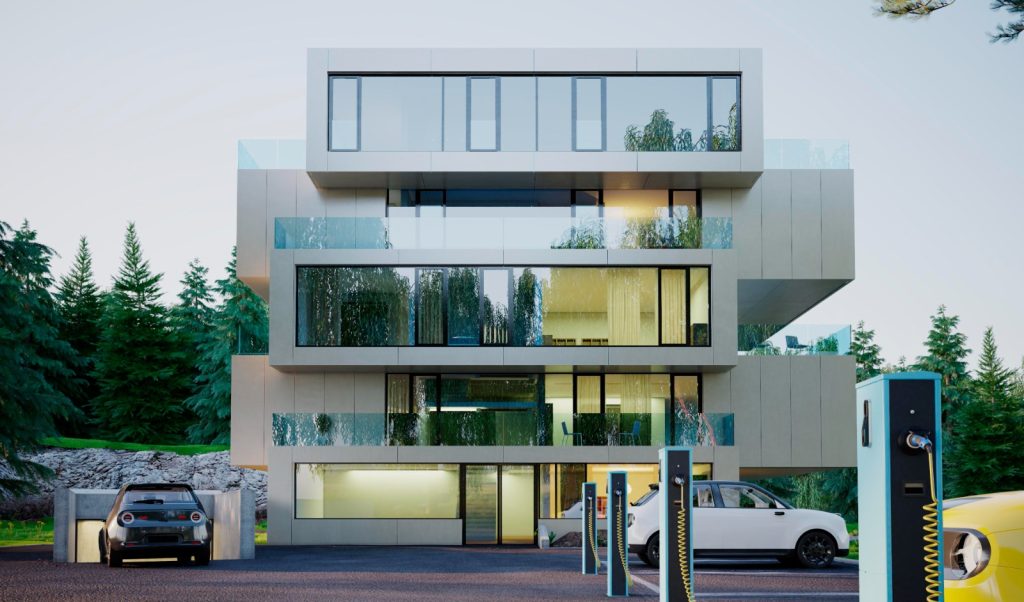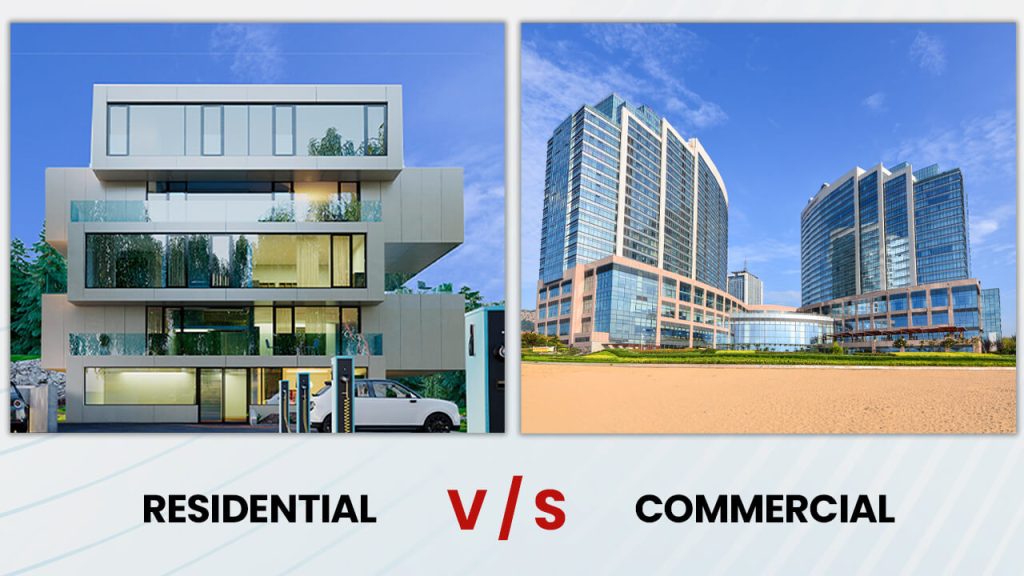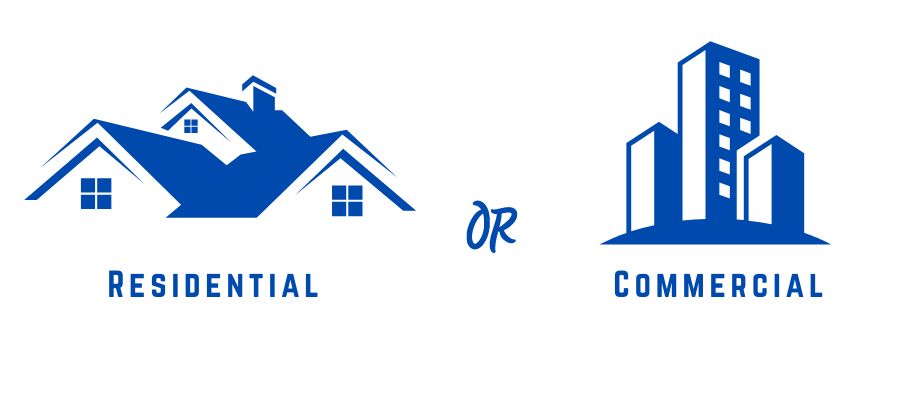When it comes to real estate, two primary categories of properties exist: residential and commercial. Residential properties, like houses and apartments are used by people to live in, while commercial properties, like offices and stores, are used for business purposes.
Understanding the difference between residential and commercial property is essential for individuals looking to enter the real estate market as investors, renters, or professionals. It allows them to make decisions on the basis of their specific goals, whether it’s finding a place to live, starting a business, or building a real estate portfolio. In this blog post, we’ll help you understand the differences between residential and commercial properties.
Residential Properties

Residential properties are properties that are designed for people to live in. These properties include houses, apartments, condominiums, townhouses, and other similar structures. These properties are primarily used for residential purposes, meaning that people live in them.
Residential properties are typically owned by individuals, families, or groups of people who are looking for a place to call home. Residential properties are usually smaller in size compared to commercial properties. They have limited rooms, and their design focuses on providing residents comfort and livability. They are located in residential areas, which are quieter and more peaceful compared to commercial areas.
Commercial Properties

Commercial properties are properties that are designed for business purposes. They encompass many establishments, including office buildings, retail stores, restaurants, warehouses, industrial complexes, hotels, and more. These properties are primarily used for commercial purposes, meaning that they are used to generate income.
Commercial properties are typically owned by businesses or investors looking for a profitable investment opportunity. Commercial properties are usually larger compared to residential properties. They have more rooms, and their design is focused on providing functionality and efficiency to business operations. They are located in commercial areas, which are busier and more crowded than residential areas.
Residential vs. Commercial Properties: Comparison Table
| Residential property | Commercial property | |
| Purpose | Living and renting purposes | Business and investment purposes |
| Capital Required | Less capital required | More capital required |
| Demand | More demand for housing and residential use | Demand dependent on the economic health |
| Maintenance Costs | Lower maintenance costs | Higher maintenance costs |
| Construction Costs | Lower construction costs | Higher construction costs |
| Lease Times | Shorter lease times | Longer lease times |
| Returns on Investment | Lower returns compared to commercial | Higher returns compared to residential |
| Risk Factors | Lower associated risks | Higher associated risk |
| Convenience | Convenient and hassle-free process | More complex and time-consuming process |
Difference Between Residential and Commercial Property

Residential and commercial properties are distinct types of real estate properties that serve different purposes and have different characteristics. Here are the main differences between the two
Purpose and Usage

The main difference between residential and commercial properties is their primary purpose and usage. Residential properties are primarily intended for accommodation purposes. They are designed and built to provide housing for individuals and families.
Residential properties typically feature amenities and facilities that cater to the comfort and convenience of the residents, such as bedrooms, bathrooms, kitchens, living areas, and recreational spaces.
On the other hand, commercial properties are intended for business-related activities and commercial use. These properties are premises for conducting commerce, trade, or other business. They are often characterized by specific features that support business operations, such as open floor plans, office spaces, display areas, storage facilities, and specialized infrastructure.
Return on Investment

Residential properties can make money through renting, but they usually earn less than commercial properties. Commercial properties are designed to make money and often have higher rental rates, which means investors can earn more. Commercial properties also offer longer lease agreements, making their income more stable and predictable.
Location

Residential properties are located in residential areas, which are quieter and more peaceful compared to commercial areas. Commercial properties are located in commercial areas, which are busier and more crowded than residential areas.
Maintenance and Management

Residential properties usually involve less complex maintenance and management compared to commercial properties. While homeowners may be responsible for maintenance and repairs in residential properties, commercial properties often require professional property management.
Commercial leases usually transfer maintenance and repair responsibilities to tenants, which can require specialized contractors and ongoing oversight. Additionally, commercial properties may require compliance with specific regulations and zoning laws.
Market Dynamics

Residential and commercial real estate markets operate differently. Residential properties are influenced by factors such as population growth, demand for housing, and interest rates. These factors can greatly impact the value and appreciation potential of residential properties.
On the other hand, commercial properties are more closely tied to economic indicators and business activities. The demand for commercial spaces depends on factors like job growth, industry trends, and market conditions. Economic downturns can impact commercial properties, making them more volatile than residential ones.
Consumers Pool

Regarding housing, there is always a steady demand from individuals who want to rent or buy a house. This means a large pool of potential buyers or renters are available. On the other hand, commercial properties are mainly sought after by businesses, organizations, and retailers.
These entities typically have specific requirements and are less likely to consider alternative options if they already have a well-established location.
Legal Considerations

Residential properties are subject to housing laws, zoning regulations, and tenant rights and protections. These laws vary by jurisdiction but typically cover areas such as rental agreements, eviction processes, property maintenance standards, and safety requirements. Governments often enforce these regulations to ensure the well-being and protection of residents in their homes.
Commercial properties are governed by commercial real estate laws and regulations, which vary by jurisdiction. These regulations cover areas such as leasing contracts, commercial zoning restrictions, building codes, environmental regulations, and compliance with accessibility standards.
The legal framework for commercial properties is designed to maintain fair business practices, protect the rights of tenants and landlords, and ensure safety and compliance in commercial spaces.
Risk Profile

When you buy a house or apartment, the risk is usually lower because they are cheaper, in higher demand, and not as affected by economic problems. People tend to live in them for a long; therefore, you get a steady income. Also, getting a loan for residential properties is easier and more affordable for individuals.
The risk is usually higher when you buy a building for business purposes, like an office or a store. These properties are more expensive and can be affected by economic problems. It’s also harder to get a loan for commercial properties, and you may need a bigger down payment or a good credit history. Plus, there’s a higher chance of not having tenants, so your income can be unstable.
Purchasing Formalities

When you want to buy a house, you start by finding a house you like and making an offer to the person selling it. If they accept your offer, you will check if the house is in good condition and fair price. After that, you and the seller finalize the sale and transfer the ownership of the house to you.
Buying a commercial property is more complicated. First, a business or investor looks for a property that suits their needs and researches to ensure it’s a good investment. They check the local market, study financial projections, and assess the property’s condition.
Once they decide to buy, they negotiate with the seller to agree on the price, terms, and other details. The closing process for commercial properties involves more legal and financial paperwork, and more people are involved. It can take longer, and the buyer may need to get a loan from a bank or find investors to help with the purchase.
Residential or commercial? Which One Should You Invest In?

Now that you know the differences between both residential and commercial properties, the question is, which one should you invest in?
The answer to this question depends on several factors, such as your budget, investment goals, and risk tolerance. Residential properties are a safer investment option compared to commercial properties.
They are less risky and have a more stable rental income. However, they also have lower rental yields compared to commercial properties. Commercial properties, on the other hand, are riskier investment options but have higher rental yields. They are more profitable, but they also require a higher upfront investment.
Conclusion In conclusion, residential and commercial properties differ in terms of purpose, use, ownership, design, and location. Residential properties are designed for people to live in, while commercial properties are designed for businesses to operate in.
When it comes to investing, residential properties are a safer investment option, while commercial properties are riskier investment options but have higher rental yields. Ultimately, the choice of investing in either residential or commercial properties depends on your investment goals and risk tolerance.
Conclusion
Distinguishing between residential and commercial property is vital for individuals involved in the real estate sector. By understanding the fundamental differences in purpose, usage, financial considerations, and legal aspects, one can make informed decisions when investing, renting, or managing properties in either category. Whether you are seeking a place to call home or looking to embark on a commercial venture, recognizing the unique characteristics of each type of property will help you navigate the complex world.

